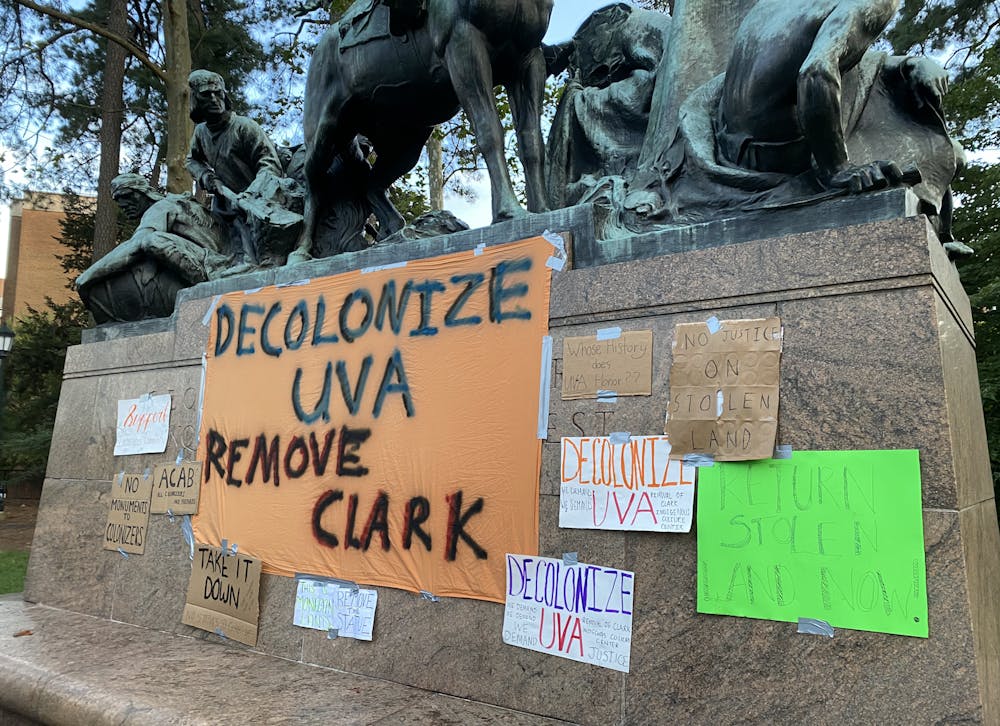Finally, Virginia officially celebrated its first Indigenous People’s Day, formerly known as Christopher Columbus Day, Oct. 12. This change in name and observance marked a step towards acknowledgement and appreciation for Native Americans, whose land we all occupy. However, this change was merely a step in the right direction for the Commonwealth. Likewise, while the University has taken steps in the right direction towards justice for Native Americans, it has a long way to go. Although the University occupies Monacan land, Native students remain underrepresented, comprising less than 1 percent of the total student body.
To even begin unravelling the damage caused by its colonial past, the University must work to increase the admittance of Native students and to meet their existing demands. For example, Native students and activists have called for a Native and Indigenous studies program, which the University claims it will address under initiative 12 of the most recent Racial Equity Task Force entitled, “Audacious Future.” However, the urgency of addressing these initiatives remains in question. The University should prioritize addressing the concerns and demands of Native students and activists not as an “Audacious Future” but as an “Overdue Now.”
These reforms are urgent, as Native American students have a national college enrollment of 19 percent as of 2016, as well as a higher education graduation rate of 39 percent — lower than any other ethnic or racial group. Despite the increasing diversity of each subsequent class, the number of enrolled Native students at the University has remained largely unchanged. Furthermore, the University has seen an overall drop in enrollment for the 2024 class. This may suggest that the pandemic has created a dilemma for students affected by COVID-19 restrictions or by financial burdens including travel. The pandemic merely brought attention to the already existing disparities between majority and minority groups. This is a reality for Native populations disproportionately affected by COVID-19 and where pursuing higher education often poses a financial burden.
Native Americans have waited too long for justice. The University has the funds and the position to change the racial narrative now. This can be achieved not only through raising funds as the Racial Equity Task Force suggests, but through the redistribution of existing funds from less urgent renovations and construction projects to reforms that protect and empower marginalized groups. The University should not allow another project such as the Memorial to Enslaved Laborers, originally a student-led initiative proposed in 2010, to be completed 10 years later.
Despite the University’s commitment to remove the George Rogers Clark Monument, there are currently no concrete plans for further actions for the space despite calls from Native activists like Anthony Guy Lopez for the construction of an Indigenous cultural center.
Change is more than removing symbols of oppression. Change is working to undo and prevent majority factions from benefiting off the historical and ongoing oppression of marginalized groups. Change is understanding the unique circumstances Native students may face, including not being a member of a nationally recognized tribe, being of multiple ethnic and racial ethnicities or being of dual tribal and American citizenship. There are ways to encourage inclusion and create a safe space for Native students of varying experiences. Robin Starr Zape-tah-hol-ah Minthorn, a professor at the University of Washington Tacoma, lists these methods, including signing memorandums of understanding with Native Tribes, a Native faculty and administration presence and investing in a Native student gathering space.
Nationally, Native Americans continue to wrestle with the effects of colonialism, and people continue to benefit from it. We continue to see the blatant disrespect for Native Americans — football teams and schools throughout the country continue to use offensive mascots and slurs to represent their teams. In addition, this country continues to inaccurately characterize Native people in history and statues. In achieving racial reform, actions speak louder than words and empty apologies. Although racial reform is a collective national effort, the University must establish its commitment and funding to meet demands for change. The University’s position of historical racial injustices necessitates the urgency to overcome the modern day repercussions of those actions through swift and decisive action.
Today, we acknowledge the truth of Columbus’ maritime expeditions, which included mass genocide, rape and the forced removal of Native people to clear the way for European settlers. Recognizing that Columbus was not a venerated hero nor a discoverer — but rather an oppressor and a pillager — is progress. However, this shift in perspective took longer than it should have. His rampage and those of past colonizers continue to paint the Native experience and identity through multiple facets. Native Americans have the highest poverty rate of any ethnic and racial group at 25.4 percent. Further, the number of Native languages continues to decline — today, there are approximately 175, but this figure is estimated to decline to 20 by 2050. These are tragic repercussions of colonialism and a current reality for many Native Americans.
We are occupiers of Native land, and thus, beneficiaries of colonialism. Therefore, we each have a role in dismantling the lingering damages of colonialism. To begin, we must acknowledge its ramifications within our individual lives. I am descended from Taino and Guachichil Natives, the cultures and languages of whom I will never learn. However, having also descended from colonizers, I acknowledge that my ancestors likely contributed to loss of culture, of language and of life. Although we cannot rewrite the past, we can create a better reality for current and future generations. The University must begin by bringing the voices of the marginalized to the table.
Yssis Cano-Santiago is a Viewpoint Writer for The Cavalier Daily. She can be reached at opinion@cavalierdaily.com.
The opinions expressed in this column are not necessarily those of The Cavalier Daily. Columns represent the views of the authors alone.







